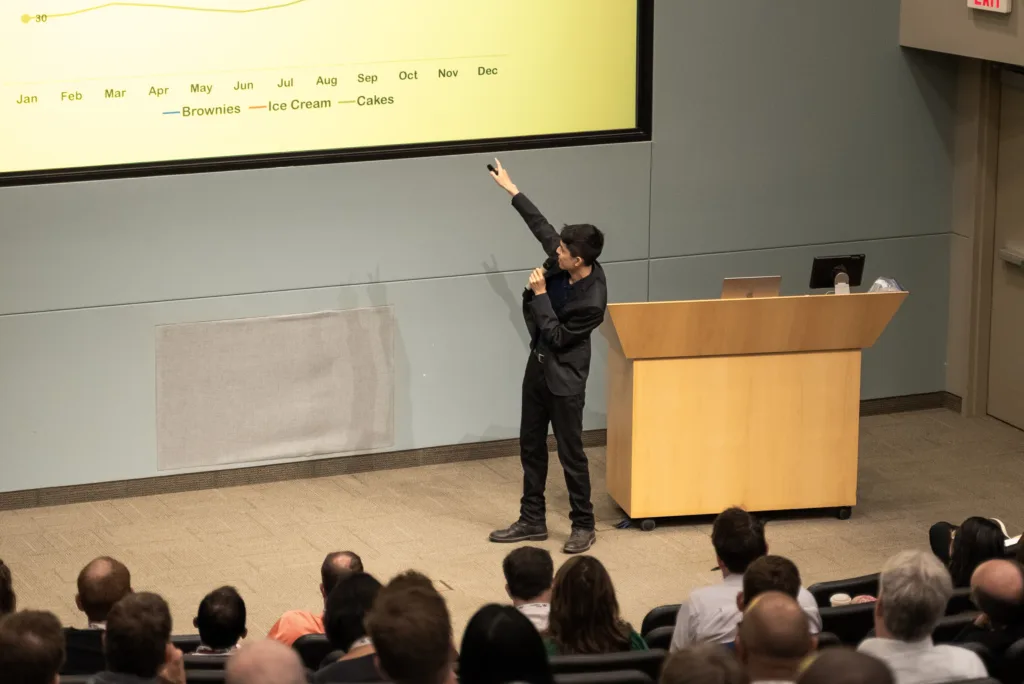If it were up to you, what would you change about the school or education system to better prepare students for a more fulfilling life and career?
In the (American) educational system, I’ve found verbal communication to be one of the most fundamental skills to personal and professional fulfillment that is consistently undervalued:
- By the time I graduated college, I realized I had never had a mandatory course on how to speak.
- I knew how to do advanced calculus, how to write about ancient masterpieces of western and eastern literature, and that the mitochondria is the powerhouse of the cell.
But I never was instructed what it meant to verbally communicate clearly, concisely, and confidently, and convincingly.
Imagine my shock entering the workforce and asked to present to a room of senior managers and executives. I watched colleague after colleague deliver their portion and the audience just zone out in complete, utter, and unsurprising boredom. One person even left the room and never came back.
In school, we must help students not just learn language (English or otherwise) – not just the atomic grammar and vocabulary and past participles and present progressives. To prepare them for a successful future, we have to teach them the bigger picture of how to command that language to persuade, motive, and inspire.
In a standard English class, for example, we’re instructed to read part of a book, think about some aspect of it, write a response, and submit it to the teacher. Then during the class itself, we’re asked to raise our hand to talk about it. While the written assignments get instructor feedback (and class time is devoted to the proper writing of essays), students are rarely (if ever told) whether their verbal articulations of ideas are “good”:
- How do you get to the point quickly and not ramble through a bunch of tangents?
- How do you give a presentation that grips people’s attention?
- How do you formulate a cogent response if asked a question on the spot?
These are skills that will make students formidable in the workplace – to help them interview well, advocate for a promotion, and raise their visibility among peers and managers through memorable presentations. And above all these are skill that help students become confident communicators in their personal lives.
I struggled to learn these skills – these life skills. But future students should not have to struggle to learn them.
Can you take a moment to introduce yourself?
When I worked in the tech industry, I saw brilliant colleagues around me struggle in their careers because of lack of communication training.
It was something that struck me as exceptionally strange:
- Because these colleagues were proactive about optimizing every other aspect of their skillset – from getting a certification in the newest cloud platform to taking a course in the newest data visualization tool.
- But communication was low priority – or even undesirable.
I continued to hear things like:
- “My work should speak for itself”
- “They can’t fire me because I built the whole system”
- “People who are good at communication are just naturals at it”
I hate to break those iron-clad bubbles, but each of those statements is patently false.
1. Work doesn’t speak for itself.
I knew one person who wasn’t promoted for 15 years because they didn’t work on communication skills. They did exceptional technical work – better than anyone else on the team, and worked harder than anyone else I knew. But their manager said they could not progress to a managerial position unless they learned to communicate effectively.
2. Technical ability also does not equal value.
I saw countless great products flop because they failed to solve user problems. Without taking the time to truly understand user needs and communicate benefits to them, time, effort, and (most importantly) money will be wasted on something that gathers dust on a shelf. And as a further nail in that coffin, with the rise of AI that can automate simple technical tasks, it is the ability of people to communicate (not just code) that will be key to visibility as an essential business partner.
3. Lastly, communication is not a “soft skill”.
In fact, it is often one of the hardest things to learn. But it is learnable. What I do as a communication coach and trainer for tech professionals is teach communication like every other technical skill they know: in a logical, structured way.

First, I start with the “development environment”.
In IT, this is the stage where we test out ideas and play around with new implementations. For communication, this is the stage where I change the way professionals think about speaking. Many, for example, hold limiting beliefs like “everyone will judge and criticize me as soon as I open my mouth or “I should impress an audience with everything I know”. You cannot communicate with confidence unless you think confidently.
Next I move to the “staging environment”.
In IT, this is where we create the “almost-ready” version of our product, but do some last-minute testing to make sure everything is running smoothly. For communication, this is where I teach professionals how to look and sound confident – how to demonstrate executive presence – so that the way they think is reflected in the way they act. (When learning technical skills like code, this is akin to the way we begin to achieve mastery. With the theory down, now we need to put it into practice).
Finally I move to the “production environment”.
This is when we release our technical product or, in the case of communication – ourselves – out into the wild. Now that we know how to think and how to act, we can deliver a presentation that demonstrates the best practices of confident communication. In an analogy to learning technical skills like coding, this is when we’ve mastered theory and application, and can now more broadly apply them to unfamiliar domains).
The reason I believe communication feels so hard and unattainable is trainings often skip straight to step 3: “what to do”.
I believe the right way to approach communication is to first learn “how to think”. Because once you know how to think, you begin to optimize yourself – in a very natural way.
This battle-tested 3 step process is what I’ve used to help individuals and entire technical teams become proficient and confident in their communication. One Director of Business Intelligence at UnitedHealth Group had this to say:

I started my company The Hidden Speaker to close the biggest gap I identified in the tech industry: communication. Through private coaching, group courses, and corporate trainings, I’ve seen how empowering this skill can be for professionals who typically prefer being behind a computer screen. When you learn to communicate with confidence – when you bring out your hidden speaker – that’s when you realize how powerful your voice is in shaping your own career and the impact you have in your organization.
Have you ever had to pivot?
Before starting my business in communication training, I had a previous business as a music composer.
- My original dream was to write music for the big Hollywood films, to help people tell their stories.
- It was one of the most exciting times of my life because I got to be creative (a must for me as an entrepreneur) and work with extremely talented and passionate fellow professionals.
Unfortunately, my dream was short-lived. I needed to find more financially reliable employment, and decided to pivot into tech.
I eventually stumbled upon data storytelling: a career path that let me be simultaneously creative, financially sound, and have the capacity to influence organization-wide decision-making.
- The role involved analyzing data, and presenting its insights to management that would enable greater profit, efficiency, or use of resources.
- It was in this field that I discovered the power of good communication and how important it was for all technical professionals to learn this valuable life skill.
While I don’t write music for a living anymore, I still help others tell their stories – just with words and numbers instead of notes. And I, even more so, have the privilege of working with extremely talented and passionate fellow professionals who want their voices to be heard. With my communication training company, I now have the opportunity to fulfill my original dream, but this time on a much wider and more impactful scale.
What do you think helped you build your reputation within your market?
What I’ve become most known for is an inclusive, customized approach to teaching communication. My belief is that there is no “right way” to speak. When I work with an individual, my goal is not to make them the next “Steve Jobs” or the next “Sheryl Sandberg”. My goal is to make them the best version of themselves.
I worked with one individual who was naturally very introverted:
- The key to making them a great speaker was not having them be loud and expressive, as typically characterizes leaders we see at work and in the media.
- Instead, the key was elevating their innate tendency to think deeply about their words, and refine their pacing to give a greater air of weight and authority.
I worked with another individual was naturally very extroverted, but had difficulty telling stories involving data and numbers:
- The key to making them a great speaker was encouraging them to make quantitative information as human as possible, thereby leaning into their instinctive desire to connect with other people.
- Every statistic, for example, was tied to the people it described or the impact it had on them.
For that reason, I don’t like using cookie-cutter curriculums:
- What I prefer doing is customizing my 3-step methodology (which starts with mindset, proceeds to executive presence, and ends with creating compelling content) – mixing, matching, adding, subtracting, and enhancing the content to best address each individual’s needs.
The result is a transformation I am very proud to see unfold in each client, and that through word-of-mouth has helped carve for me a unique coaching niche in the tech and data space.
This blog contains excerpts from an interview conducted by Chris Martinez. The full article was originally published in CanvasRebel on June 20, 2024
Check out these related resources on how to use communication skills to enhance your career:
- Communication Self-Assessment, which provides personalized recommendations on areas of growth
- My Program that has helped tech and data professionals use communication to get the promotions and opportunities they deserve




Pingback: 5 Techniques for Becoming an Effective Communicator